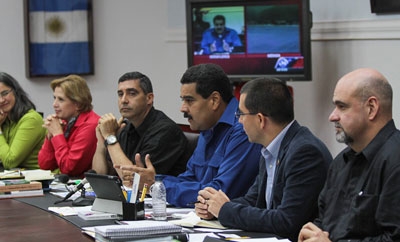The Venezuelan government plans to create a new force tasked with patrolling the border with Colombia, which will face an uphill battle if it is to make a dent in crime in a region where criminal groups, corrupt security forces and general lawlessness run rampant.
President Nicolas Maduro announced the government will create a Joint Task Force, which will be a “civic-military” initiative bringing together area residents, political actors and security forces with the goal of reinforcing border security. The president said the initiative is about “the people taking the lead in guaranteeing life,” according to a government press release.
The president said the main goal of the force is to fight the “mafias” on the Colombia-Venezuela border and combat the contraband trade in cars, food and gasoline. Maduro said that he had already given orders for the creation of the force to begin.
InSight Crime Analysis
Both Colombian guerrilla groups such as the Revolutionary Armed Forces of Colombia (FARC) and the criminal organizations known as the BACRIM (from “bandas criminales” or “criminal bands”) like the Rastrojos have long maintained a presence in the Venezuela border regions, a presence that has grown alongside Venezuela’s role in the drug trade.
The border region is also a smuggling hotspot, with smugglers and criminal groups looking to launder drug profits exploiting economic conditions such as Venezuela’s fuel subsidies and blackmarket currency exchanges. Both smuggling and drug trafficking are facilitated by corruption within the security forces, which reaches to the top levels with the so-called Cartel de los Soles — a drug trafficking network consisting of high-ranking members of the military.
The idea for a Venezuelan task force to combat organized crime bears similarities to a number of Colombian Joint Task Forces tasked with combating the FARC, including the Joint Task Force Omega which operates in the Meta department and has made serious blows to the FARC’s Eastern Bloc in that region.
However, in Venezuela, the mix of Colombian organized crime groups, corrupt security forces and a poor internal security situation means there remain serious doubts over whether such a force could have the same impact on what is much a broader target.

